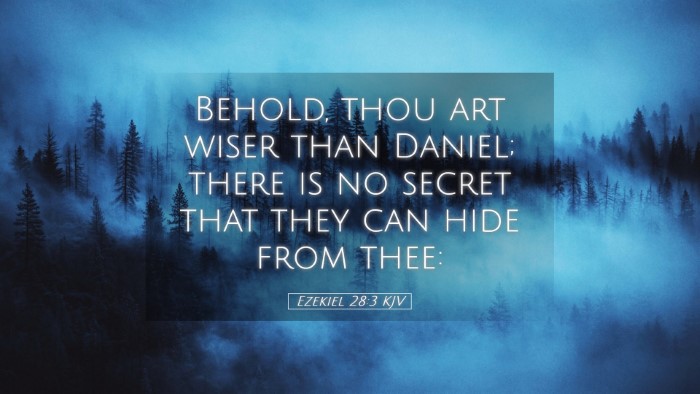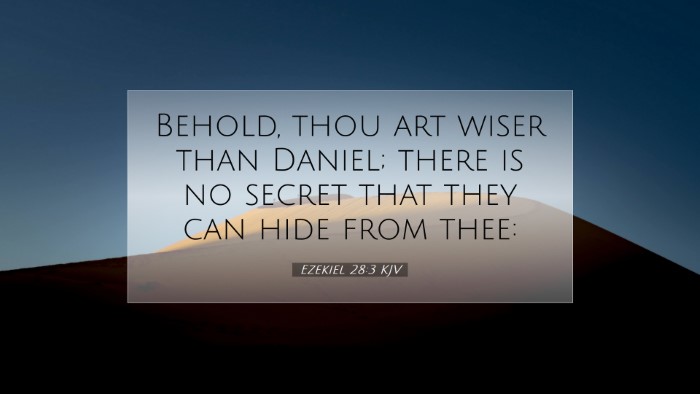Ezekiel 28:3 - A Comprehensive Commentary
Verse: Ezekiel 28:3 - "Behold, thou art wiser than Daniel; there is no secret that they can hide from thee."
Contextual Background
The book of Ezekiel is a rich tapestry of prophecies and visions delivered to the Israelite exiles in Babylon around the early 6th century BC. Ezekiel, a priest and prophet, conveys messages of judgment, restoration, and hope to the people of Israel. Chapter 28 specifically addresses the King of Tyre, symbolizing pride and arrogance against God. In this verse, the mention of wisdom invokes the theme of true versus false wisdom.
Commentary Insights
1. The Contrast of Wisdom
According to Matthew Henry, this passage highlights the false wisdom of the King of Tyre, which he parallels with the genuine wisdom found in Daniel. Daniel, known for his insight and understanding (Daniel 1:17), serves as a benchmark against which the king's supposed wisdom is measured.
Henry observes: "The king prided himself in his acumen, yet it is clear that no amount of earthly wisdom can equal the divine insight bestowed upon Daniel, which comes only from God."
2. The Nature of Secrets
Albert Barnes elaborates on the significance of 'secrets' in this verse. He indicates that the context suggests that the king believed he was privy to knowledge and secrets that gave him an advantage over others.
However, Barnes asserts: "Such arrogance blinds him to his limitations." The implication is that true wisdom acknowledges the sovereignty of God and the need for humility.
3. The Perils of Pride
Adam Clarke reflects on the nature of pride, using this verse to explore its dangers. He emphasizes that the King of Tyre’s self-perception as 'wiser than Daniel' is a direct result of hubris. Clarke states, "Pride often leads to a fall; it distorts judgment, obscures the truth, and ultimately leads to one’s ruin."
This fits into the broader biblical narrative where pride is frequently depicted as a precursor to judgment (Proverbs 16:18).
Theological Implications
The theological implications of Ezekiel 28:3 extend broadly into lessons on humility, wisdom, and the nature of true leadership. Leaders are often tempted by the allure of status and wisdom that does not originate from God.
1. True Wisdom Comes from God
The text beckons readers to recognize that true wisdom is a divine gift. This notion parallels James 1:5, where believers are encouraged to ask God for wisdom. Both Ezekiel and James emphasize the necessity of divine revelation in understanding hidden truths.
2. The Role of the Prophet
Ezekiel, as a prophet, serves as a divine messenger, contrasting the false wisdom of earthly leaders against the backdrop of God's absolute truth. This function reminds contemporary readers of the importance of prophetic voices within faith communities, calling leaders to account.
3. The Warning Against Arrogance
This verse serves as a timely warning for all believers. Reflecting on Clarke's insights, it draws attention to the destructive nature of arrogance. As those called to lead in various capacities, the faithful are urged to cultivate humility and recognize their dependence on God.
Practical Applications
- Humility in Leadership: The reminder that human wisdom is limited encourages leaders to approach their roles with humility, seeking divine guidance.
- Discernment of True Wisdom: Believers should actively pursue wisdom rooted in relationship with God and scripture, rather than relying solely on secular understandings.
- Accountability to Prophetic Voices: Regularly engaging with prophetic literature, whether ancient or contemporary, keeps the church oriented towards God’s truth.
Conclusion
Ezekiel 28:3 reveals profound truths relevant to the modern believer, highlighting the contrast between earthly and divine wisdom. Each commentary provides layered insights, inviting readers, especially leaders in the Church, to reflect deeply on their role and dependence on God. The exploration of wisdom, pride, and accountability is instrumental in shaping a faith community that seeks after God’s heart in leadership and daily living.


